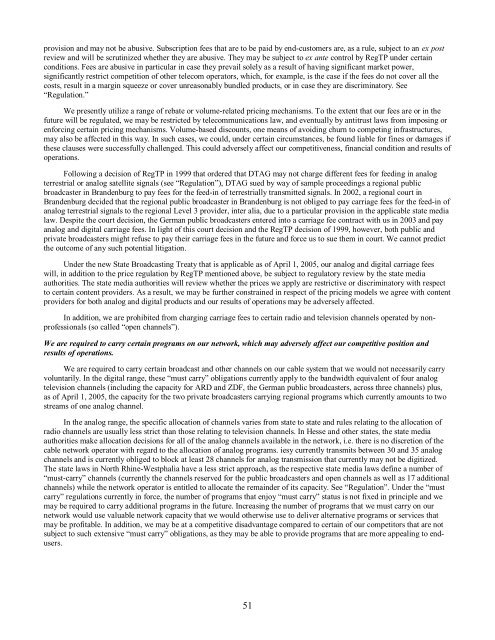iesy Repository GmbH - Irish Stock Exchange
iesy Repository GmbH - Irish Stock Exchange
iesy Repository GmbH - Irish Stock Exchange
Create successful ePaper yourself
Turn your PDF publications into a flip-book with our unique Google optimized e-Paper software.
provision and may not be abusive. Subscription fees that are to be paid by end-customers are, as a rule, subject to an ex post<br />
review and will be scrutinized whether they are abusive. They may be subject to ex ante control by RegTP under certain<br />
conditions. Fees are abusive in particular in case they prevail solely as a result of having significant market power,<br />
significantly restrict competition of other telecom operators, which, for example, is the case if the fees do not cover all the<br />
costs, result in a margin squeeze or cover unreasonably bundled products, or in case they are discriminatory. See<br />
“Regulation.”<br />
We presently utilize a range of rebate or volume-related pricing mechanisms. To the extent that our fees are or in the<br />
future will be regulated, we may be restricted by telecommunications law, and eventually by antitrust laws from imposing or<br />
enforcing certain pricing mechanisms. Volume-based discounts, one means of avoiding churn to competing infrastructures,<br />
may also be affected in this way. In such cases, we could, under certain circumstances, be found liable for fines or damages if<br />
these clauses were successfully challenged. This could adversely affect our competitiveness, financial condition and results of<br />
operations.<br />
Following a decision of RegTP in 1999 that ordered that DTAG may not charge different fees for feeding in analog<br />
terrestrial or analog satellite signals (see “Regulation”), DTAG sued by way of sample proceedings a regional public<br />
broadcaster in Brandenburg to pay fees for the feed-in of terrestrially transmitted signals. In 2002, a regional court in<br />
Brandenburg decided that the regional public broadcaster in Brandenburg is not obliged to pay carriage fees for the feed-in of<br />
analog terrestrial signals to the regional Level 3 provider, inter alia, due to a particular provision in the applicable state media<br />
law. Despite the court decision, the German public broadcasters entered into a carriage fee contract with us in 2003 and pay<br />
analog and digital carriage fees. In light of this court decision and the RegTP decision of 1999, however, both public and<br />
private broadcasters might refuse to pay their carriage fees in the future and force us to sue them in court. We cannot predict<br />
the outcome of any such potential litigation.<br />
Under the new State Broadcasting Treaty that is applicable as of April 1, 2005, our analog and digital carriage fees<br />
will, in addition to the price regulation by RegTP mentioned above, be subject to regulatory review by the state media<br />
authorities. The state media authorities will review whether the prices we apply are restrictive or discriminatory with respect<br />
to certain content providers. As a result, we may be further constrained in respect of the pricing models we agree with content<br />
providers for both analog and digital products and our results of operations may be adversely affected.<br />
In addition, we are prohibited from charging carriage fees to certain radio and television channels operated by nonprofessionals<br />
(so called “open channels”).<br />
We are required to carry certain programs on our network, which may adversely affect our competitive position and<br />
results of operations.<br />
We are required to carry certain broadcast and other channels on our cable system that we would not necessarily carry<br />
voluntarily. In the digital range, these “must carry” obligations currently apply to the bandwidth equivalent of four analog<br />
television channels (including the capacity for ARD and ZDF, the German public broadcasters, across three channels) plus,<br />
as of April 1, 2005, the capacity for the two private broadcasters carrying regional programs which currently amounts to two<br />
streams of one analog channel.<br />
In the analog range, the specific allocation of channels varies from state to state and rules relating to the allocation of<br />
radio channels are usually less strict than those relating to television channels. In Hesse and other states, the state media<br />
authorities make allocation decisions for all of the analog channels available in the network, i.e. there is no discretion of the<br />
cable network operator with regard to the allocation of analog programs. <strong>iesy</strong> currently transmits between 30 and 35 analog<br />
channels and is currently obliged to block at least 28 channels for analog transmission that currently may not be digitized.<br />
The state laws in North Rhine-Westphalia have a less strict approach, as the respective state media laws define a number of<br />
“must-carry” channels (currently the channels reserved for the public broadcasters and open channels as well as 17 additional<br />
channels) while the network operator is entitled to allocate the remainder of its capacity. See “Regulation”. Under the “must<br />
carry” regulations currently in force, the number of programs that enjoy “must carry” status is not fixed in principle and we<br />
may be required to carry additional programs in the future. Increasing the number of programs that we must carry on our<br />
network would use valuable network capacity that we would otherwise use to deliver alternative programs or services that<br />
may be profitable. In addition, we may be at a competitive disadvantage compared to certain of our competitors that are not<br />
subject to such extensive “must carry” obligations, as they may be able to provide programs that are more appealing to endusers.<br />
51

















